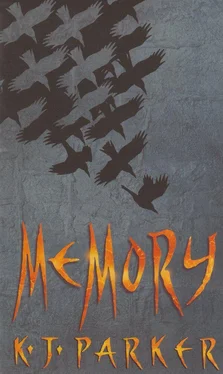K Parker - Memory
Здесь есть возможность читать онлайн «K Parker - Memory» весь текст электронной книги совершенно бесплатно (целиком полную версию без сокращений). В некоторых случаях можно слушать аудио, скачать через торрент в формате fb2 и присутствует краткое содержание. Жанр: Фэнтези, на английском языке. Описание произведения, (предисловие) а так же отзывы посетителей доступны на портале библиотеки ЛибКат.
- Название:Memory
- Автор:
- Жанр:
- Год:неизвестен
- ISBN:нет данных
- Рейтинг книги:5 / 5. Голосов: 1
-
Избранное:Добавить в избранное
- Отзывы:
-
Ваша оценка:
- 100
- 1
- 2
- 3
- 4
- 5
Memory: краткое содержание, описание и аннотация
Предлагаем к чтению аннотацию, описание, краткое содержание или предисловие (зависит от того, что написал сам автор книги «Memory»). Если вы не нашли необходимую информацию о книге — напишите в комментариях, мы постараемся отыскать её.
Memory — читать онлайн бесплатно полную книгу (весь текст) целиком
Ниже представлен текст книги, разбитый по страницам. Система сохранения места последней прочитанной страницы, позволяет с удобством читать онлайн бесплатно книгу «Memory», без необходимости каждый раз заново искать на чём Вы остановились. Поставьте закладку, и сможете в любой момент перейти на страницу, на которой закончили чтение.
Интервал:
Закладка:
Right, he thought, and glanced up at the gatehouse tower, hoping to see if Spenno had managed to dismantle the Poldarn's Flutes yet. But the angle was too steep-all he could see were palisades. Not to worry; the job in hand was obvious enough. He needed to rally his men, make sure they didn't pursue the retreating attackers too far, then organise work details to patch up the smashed gates.
Monach tried shouting, but he couldn't make himself heard. His voice had always been soft and quiet, and he'd never had occasion to learn how to project it. As he stood in the yard, feeling unpleasantly foolish, he caught sight of Galand Dev. The short, wide engineer was engaged in a faintly ludicrous duel with two enemy soldiers, both of them a head and a hand taller than him; but he was using their height against them, warding off their blows with a captured shield as they cut down at him, and making them skip backwards as he slashed at their knees with a short-handled adze. A few strides brought him up close enough to join in; one soldier didn't see him coming until it was far too late; the other swung round to face him and forgot about Galand Dev, an omission that cost him his life.
'Thanks,' Galand Dev panted, wiping sweat out of his eyes, 'but I was doing just fine-'
'Listen,' Monach interrupted. 'You can shout louder than me. I want you to call them back before they go chasing off through the gate and get themselves cut off. Then I'll need you back here.'
One thing Galand Dev excelled at was giving orders. Soon the last of the enemy had scuttled away under the gate, and the defenders had regrouped in the yard, with Galand Dev barking out assignments by platoon.
Fixing up the gates didn't take nearly as long as Monach had expected it to. One platoon lifted them up and walked them back into position-they'd been ripped off their hinges, and the locking bar had snapped in two, but the panels themselves were hardly damaged at all. Another platoon fetched heavy poles and bricks; they weren't master masons or joiners, but they knew how to prop and wedge. Besides, Monach reflected, he didn't want the gates to keep the enemy out permanently. Just long enough.
He shuddered, not really understanding why. There was, after all, no difference. He could feel the damp warmth in the cuffs of his shirt, other people's blood, an occupational hazard for those who favour the lateral cut off the front foot. Severed veins spurt; there's a knack to blinking the blood out of your eyes quickly, so you don't lose the plot in the middle of a complex sequence of moves. No difference, not even in religion, between a subtle feint that deceives one swordsman, and the setting up of a fire-spitting monster behind a wicker screen…
Inappropriate thoughts: you could maybe just about get away with them as a foot soldier, a follower of orders, but not when you're in charge. Instead, he should be playing chess in his mind, figuring out the move after the move after next. (But Monach hadn't got a clue what he was going to do, let alone what the enemy were planning; he couldn't play chess worth spit, either.)
Still.
'We'll need to reinforce the east wall,' he heard himself telling someone. 'Who's in charge up there, anyhow?'
The man Monach was talking to mentioned a name he didn't recognise; it was as though his memory had been wiped away, like moisture off glass. 'Fine,' he replied. 'Take one man in five off the south wall, they won't try anything there.'
Whoever it was he was talking to didn't seem to agree with that. 'You sure? It's high ground on that side, if I was figuring where to put ladders-'
Monach grinned. 'You've forgotten your precepts,' he said. 'Strength is weakness. East wall's the strongest point, so they'll reckon we won't bother so much with defending it. Same principle as with the gates,' he added, for his own benefit mostly. 'Weakness is strength.'
The man (a sword-monk, Monach remembered) grinned suddenly. 'I remember that one from classes,' he said. 'I thought it was a load of shit back then, too.'
Colonel Muno, or whoever was commanding the enemy, couldn't have read the precepts of religion; or else he shared the sword-monk's low opinion of them. He attacked the east wall, just as Monach had anticipated; he brought up siege ladders-the trunks of fifty-year-old ash trees, taller by a yard than the walls and cut with slots up one side to serve as rungs-and sent his men clambering up them like terrified spiders. Monach had his men push down the first three or four; but the wall was too low for the drop to be fatal or even debilitating, and most of the ladder-climbers picked themselves up after they'd hit the ground and immediately set about righting the ladders for another attempt. So Monach told his people to let the bastards come, and placed sword-monks on the walkway at regular intervals. He denied himself the indulgence of joining them.
The essence of religion is, of course, simplicity; it aims to pare away distractions, on the assumption that the divine is an indivisible perfection. There was something wonderfully simple about sword-monks setting about religion, if you could put out of your mind the (distracting) fact that they were cutting human tissue and bone. A purist-Father Tutor, say-might have quibbled, pointing out that their choice of cuts was too diverse for perfection; some of them favoured the downwards diagonal into the junction of neck and shoulders, others the rising diagonal across the throat, while others opted for a flamboyant, almost blasphemous celebration of variety, ranging from the minimal thrust to the full sweep of the arms, laterally off the back foot, shearing the head off the neck in a shocking waste of energy. Monach (who had specialised all his adult life in just the one cut, a swift drawn slice across the windpipe) didn't really mind, which in a sense was a failure on his part. His only real concern was to keep the enemy out of the enclosure, and so far his approach seemed to be working.
So efficient were the sword-monks, in spite of their lack of true focus, that the enemy commander abandoned the direct assault with ladders after a few minutes-long enough for the dead bodies to become a nuisance and a hindrance to movement on the narrow walkway, but not nearly as long as Monach would have liked. Since there was no danger of losing at this game, he'd have preferred it to continue for an hour or more, with less mayhem but more time-wasting, so as to give Spenno a chance to get the Flutes down from the tower and into the yard. Instead, the enemy withdrew their ladders and almost immediately resumed their attack on the already mangled gates. It wasn't hard to follow the reasoning behind the switch. Monach could only have so many of these bloodthirsty maniacs at his disposal, and the rest of his sad little army was made up of day-labourers, farm boys, runaway apprentices, thieves and outlaws. It would take minutes to get the sword-monks down off the wall and into the yard. It ought only to take half a minute to bash through the botched-up gates and match regular Imperial troops against the rabble. By the time the sword-monks rejoined the action, there should no longer be any scope for a series of single combats. It'd be back to proper grown-up soldiering, in which the trained unit invariably stamped flat the undisciplined individuals. Good plan.
So good, it was the strength that Monach, devout believer in precepts, was planning to attack. His idea had been to lure the bulk of the enemy force into the gateway in just this fashion, and then open up with the Flutes, charged with leather sacks full of gravel. It was annoying that the sword-monks had thwarted his unimpeachably orthodox planning by doing their job far too well.
Never mind. Yelling at Galand Dev to keep the men on the wall at their posts, Monach led the rest of his forces (even he caught himself thinking of them as 'the rabble') across the yard at a run. Mathematics, he thought, as he threw his weight against the planks of the left-hand gate. Factor: the gateway is wider on the inside than on the outside. Accordingly, it ought to be possible to get more bodies, therefore more weight, against the gates on our side than they can on theirs. A straightforward shoving match, mere muscle and body mass, and we have the numerical advantage. Simplicity.
Читать дальшеИнтервал:
Закладка:
Похожие книги на «Memory»
Представляем Вашему вниманию похожие книги на «Memory» списком для выбора. Мы отобрали схожую по названию и смыслу литературу в надежде предоставить читателям больше вариантов отыскать новые, интересные, ещё непрочитанные произведения.
Обсуждение, отзывы о книге «Memory» и просто собственные мнения читателей. Оставьте ваши комментарии, напишите, что Вы думаете о произведении, его смысле или главных героях. Укажите что конкретно понравилось, а что нет, и почему Вы так считаете.












